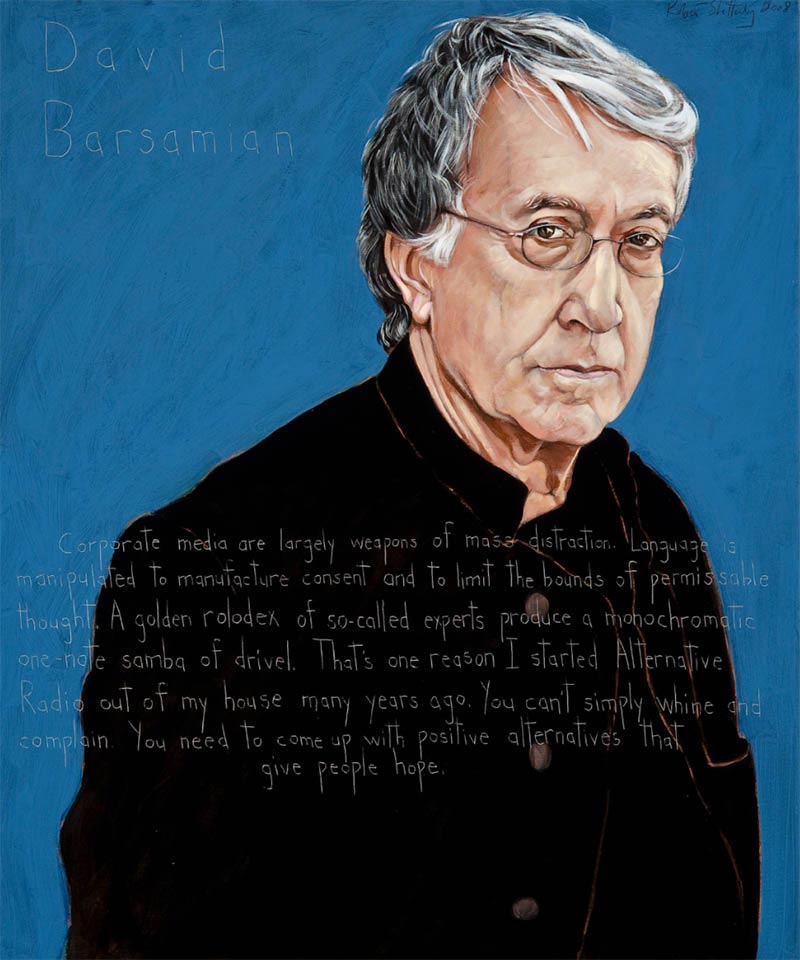
David Barsamian
Radio Broadcaster, Writer : b. 1945
“Corporate media are largely weapons of mass distraction. Language is manipulated to manufacture consent and to limit the bounds of permissible thought. A golden rolodex of so-called experts produce a mono-chromatic one-note samba of drivel. That’s one reason I started Alternative Radio out of my house many years ago. You can’t simply whine and complain. You need to come up with positive alternatives that give people hope.”
Biography
It’s easy to criticize the American media, but it’s not easy to create quality alternatives.
In 1986, David Barsamian took the initiative to do more than critique the news. Frustrated by corporate media’s lack of progressive, radical voices, he founded Alternative Radio. Now heard by millions of listeners on 175 radio stations, Barsamian’s journalism is well-respected around the world for analyzing the world´s most pressing social, economic and environmental problems and exploring possible solutions to them. He is particularly well known for his insightful interview series with Noam Chomsky, Arundhati Roy, Howard Zinn, and Tariq Ali, which have been collected into books.
Barsamian was born in New York in 1945 to refugees who had fled the Turkish genocide of Armenians. Though they didn’t have much education, they were able to open their own grocery store in New York. The family lived above the store. As the child of immigrant parents, Barsamian grew up with a strong sense of international issues, which developed further during his time spent in India in the 1960s. He regards that time as a major influence: “I was surrounded by some of that country’s greatest musicians and poets. I learned so much, including Urdu, Hindi and Bengali. It was like getting a graduate education in South Asia.” These early experiences gave Barsamian the cultural awareness that has been the foundation of his journalism.
In 1978, Barsamian took on a volunteer role at KGNU community radio in Boulder, Colorado. Over eight years at KGNU, he learned the essentials of radio journalism — interviewing, writing, producing, on-air skills. He even edited reel-to-reel tape with razor blades and wax pencils. He hosted and produced two shows, “Ganges to the Nile,” an international music program, and “Hemispheres,” a political program. In 1986, he uplinked a two-and-a-half hour interview with Noam Chomsky to the public radio satellite. Though most radio stations preferred half hour or one hour segments, a few stations picked up the interview. That long converation with Chomsky was the beginning of Alternative Radio.
Barsamian never forgot the suffering his parents experienced before they came to America. He interviewed some of the witnesses of the Armenian Genocide, including his mother, Araxie. Though he wanted very much to know about his mother’s experiences, it was painful to make her revisit memories of death and destruction. He describes those interviews as the most difficult of his career. However, as he did them, he discovered that the uncomfortable interviews helped him and his mother deal with the difficult personal and political history. Barsamian’s experience interviewing his mother showed him how important it is to listen to unheard voices; not only are those voices important to true democracy, they gives the speaker an opportunity to heal through communication.
Barsamian is boldly critical of public policy in the U.S. and elsewhere, which leads to resistance from people in power. In 2011, after disembarking from the airplane in India where he has been traveling for more than 40 years, he was denied entry to the country. At the airport, customs officials forced him to return to the U.S., offering no explanation. Some theorize that he was blacklisted after broadcasting Arundhati Roy’s criticism of India’s treatment of people in Kashmir. Many Indian intellectuals spoke out against the travel ban, and Barsamian did as well: “This arbitrary action … is not a sign of strength of Indian democracy; it’s rather a sign of weakness. A healthy, vibrant democracy should include a rainbow of different opinions, different perspectives, different points of view and it should happily embrace those kind of differences rather than seeking to impose a uniformity of thought and opinion.”
Founding Alternative Radio was Barsamian’s personal attempt to meet the goals of the Public Broadcasting Act: “to serve as a forum for controversy and debate” and “to provide a voice for groups that may otherwise be unheard.” Because mainstream media oversimplifies debate and leaves out so many voices, alternative media outlets play a crucial role in American democracy. In Barsamian’s view, “it was unacceptable that many of this country’s greatest and most articulate radical voices had no forum on public radio. Alternative Radio was created to be the vehicle for progressive perspectives that are otherwise ignored or given short shrift.”
After almost thirty years of Alternative Radio, David Barsamian continues to speak up for those who are unheard or ignored.
____________________________________________________________
Works Cited
- Barsamian, David. E-mail interview. 6 March 2013.
- Joshi, Rajesh. “In Free India I Was Denied Entry.” Outlook India. 26 Sept 2011.
Programs
Americans Who Tell the Truth (AWTT) offers a variety of ways to engage with its portraits and portrait subjects. Host an exhibit, use our free lesson plans and educational programs, or engage with a member of the AWTT team or portrait subjects.

Education
AWTT has educational materials and lesson plans that ask students to grapple with truth, justice, and freedom.

Exhibits & Community Engagement
AWTT encourages community engagement programs and exhibits accompanied by public events that stimulate dialogue around citizenship, education, and activism.